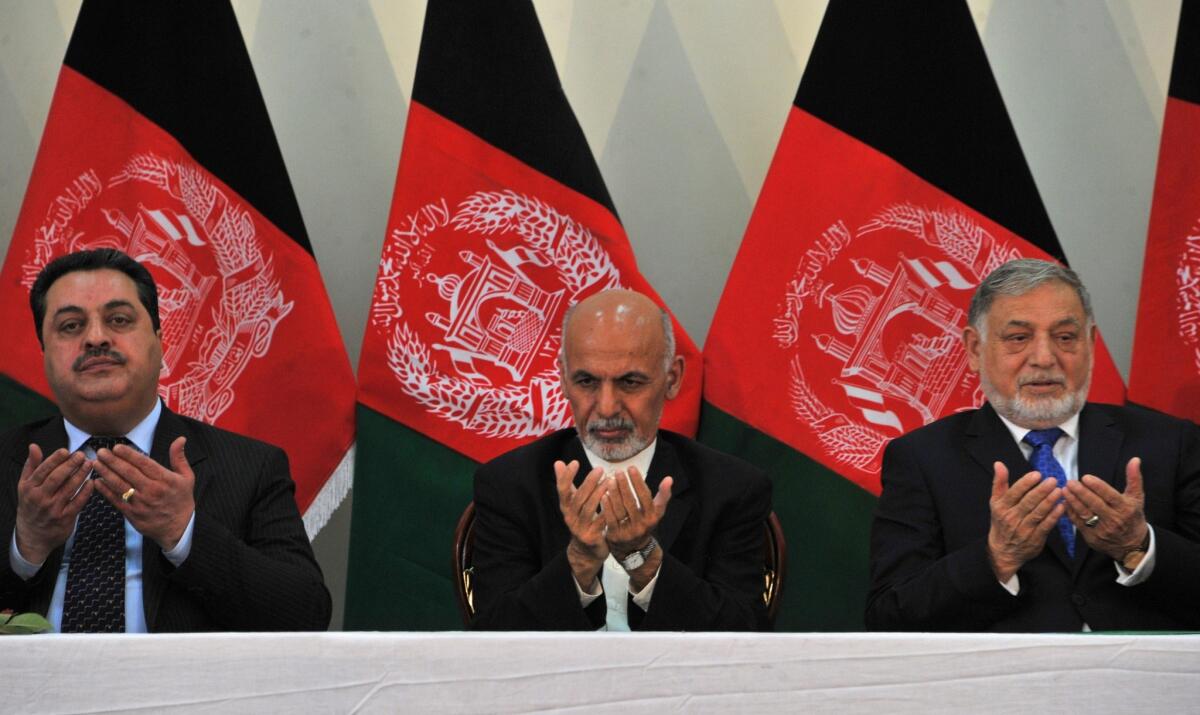Taliban beheads 12 in Afghan clash; Ghani declared election winner

- Share via
Reporting from Kabul, Afghanistan — A major Taliban offensive in a strategic province south of Kabul has left at least 12 people dead and destroyed scores of homes, officials said Friday, illustrating the insurgent group’s growing strength as Afghanistan prepares to inaugurate a new president.
After a week of heavy fighting, Taliban militants gained control of a western district of Ghazni province and beheaded at least 12 relatives of members of the Afghan security forces on Thursday, according to provincial officials.
Some 600 militants went on a rampage, setting fire to at least 60 houses in the district of Arjestan, said Asadullah Safi, a police official in Ghazni.
Afghan security forces sent in reinforcements by helicopter Friday to battle the insurgents, who have steadily been making inroads into Ghazni. Early this month, a coordinated truck bomb attack on police and intelligence buildings in the provincial capital killed at least 33 people.
Located along the strategic highway that connects Kabul, the capital, with the southern city of Kandahar, Ghazni has been a key focus of Taliban activity for much of the last decade. The insurgents have also launched offensives in Helmand province in the south and Kunduz in the north in a bid to capitalize on political instability in the wake of a controversial presidential election.
The president-elect, Ashraf Ghani, who on Sunday was declared the winner of the disputed runoff election, on Friday had his victory certified by Afghanistan’s Independent Election Commission, which said he won with roughly 55% of 7.12 million votes. He was expected to be sworn in next week.
The vote totals had been kept secret for nearly a week because of continued allegations by Ghani’s rival, Abdullah Abdullah, that the balloting and a subsequent U.N.-supervised recount were marred by irregularities. In the end, some 1 million ballots were discarded, but U.S. officials acknowledged that perhaps even more fraud had taken place.
A hard-fought compromise, brokered in part by the Obama administration, was reached last week when Ghani and Abdullah agreed to form a unity government. Abdullah said Thursday that he would assume the role of chief executive, a newly created post in which he is expected to share some decision-making authority with the president.
At the ceremony, Ghani said tackling electoral fraud would “top my agenda.”
“I disown every bogus vote and won’t defend it,” Ghani said.
Latifi is a special correspondent. Times staff writer Bengali reported from Mumbai, India
Follow @SBengali for news out of South Asia
More to Read
Sign up for Essential California
The most important California stories and recommendations in your inbox every morning.
You may occasionally receive promotional content from the Los Angeles Times.














